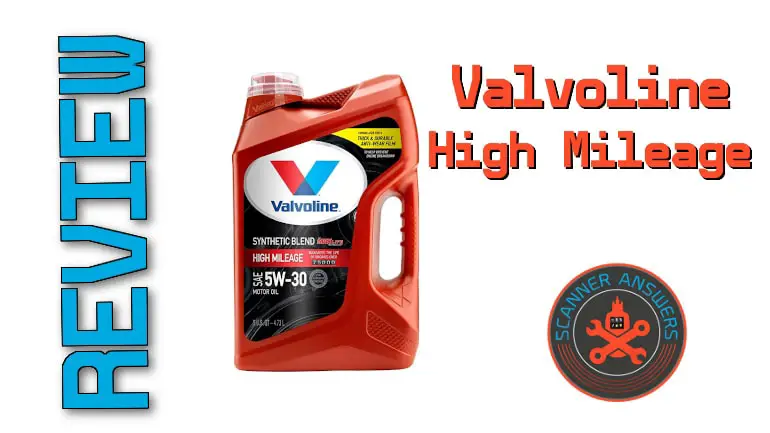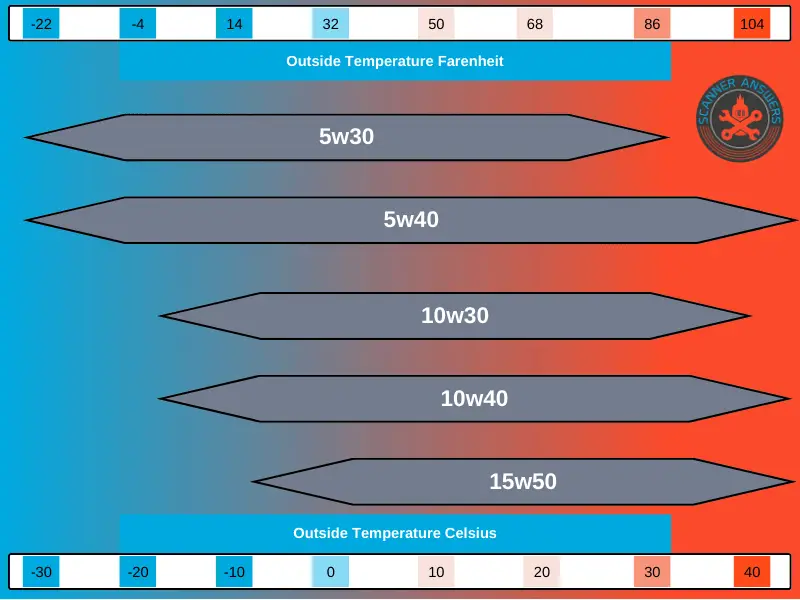In this Valvoline High Mileage motor oil review, I’ll uncover the mysteries of older engines and answer why they benefit from specifically-formulated motor oil.

But before we begin, you need to understand there are two types of high-mileage motor oils from Valvoline:
- Full Synthetic
- Synthetic blend
Despite this, both formulas contain Valvoline’s proprietary MaxLife Technology that offers better protection for higher-mileage or older engines, preferably those with mileages reaching 75,000 miles or higher.
Which Valvoline High Mileage motor oil is best for my car?
If what you mean is choosing between fully synthetic and synthetic blend, the answer depends on the age of your vehicle. If you have a later model vehicle manufactured from 1997 or older, Valvoline’s High Mileage Synthetic Blend is the better choice. Older engines require thicker blends of oil despite the lower viscosity rating, and Valvoline’s MaxLife Technology delivers the goods.
You see, Valvoline utilizes a thicker version of the oil even it meets the requirements of, let’s say, 0W-20 oil. A lower viscosity means having the consistency of water, but Valvoline employs special anti-wear and anti-oxidation additives to give the oil a thicker feel. And when talking about older vehicles with cracked or worn out oil seals, thinner oil tends to cause oil leaks, which is not what we’re looking for when changing the oil in our older vehicles.
But if you have a more modern vehicle manufactured from 2002 and upwards, the full-synthetic version of Valvoline High Mileage is a no-brainer. Most modern cars with variable valve timing require thinner motor oils with a lower viscosity rating. But in order for the oil to be as flowy as water and still offer advanced protection in both hot and cold weather, synthetic ingredients are required to fulfill the role.
And in the case of Valvoline’s Full Synthetic High Mileage motor oil, the full synthetic formula ensures exceptional high and low-temperature protection during cold starts or bumper-to-bumper traffic.
However, keep in mind it goes beyond choosing between synthetic blend or full-synthetic.
No products found.
Valvoline High Mileage: Pros and Cons
- Specifically designed for high-mileage engines with 75,000 miles or higher
- It has a higher concentration of anti-wear and anti-oxidation additives to increase engine life
- Seal conditioners and high-quality detergents prevent oil leaks and keep the engine clean
- Available in a full-synthetic and synthetic blend
- Sold in various SAE grades
- Friendly price
- High performance engines may not get the lubrication they require
What is the SAE in oil grade?
In most cases, it’s not about choosing between full synthetic or synthetic blend. The SAE rating or viscosity grade is usually more important since it has something to do with how the oil behaves during hot or cold weather. Oil tends to thicken when cold, and it thins back when exposed to heat. Using the wrong motor oil with a different SAE rating is not the end of the world, but it may lead to dire consequences in the long run.

- You can see in the graph above the 5w30 oil would be workable between -22 and 86 degrees Fahrenheit.
- 20w50 oil would be acceptable from about 30 degrees to 120+ degrees.
The SAE or Society of Automotive Engineers developed a grading system to indicate the viscosity of both single grade and multi-grade oils. We’ll focus on the latter since it’s the type of oil for most automotive applications.
No products found.
Multi-grade oils have two sets of alphanumeric grades. In the case of 0W-20, the 0W means the oil can be pumped easily by the engine at the lowest tested temperatures. Meanwhile, the 20 indicates how well the oil flows when heated to 100 degrees Celsius/212 Fahrenheit or higher. A higher number means better resistance to heat and ultimately, better overall protection against wear and tear.
Lucky Vagabond did a nice video on youtube if you want to check out his review on this oil
What is the SAE grade of Valvoline High Mileage motor oil?

Valvoline’s Full Synthetic High Mileage motor oil is available in three SAE grades:
- SAE 0W-20
- SAE 5W-20
- SAE 10W30
Also, the High Mileage Synthetic Blend is also sold in three grades
- SAE 0W-20
- SAE 5W-20
- SAE 20W-50
You might be asking why there are so many SAE grades, and the answer is simple. Since this motor oil is specifically formulated for older cars, Valvoline wants to make sure it covers the requirements on all makes and models of older vehicles, whether foreign or domestic.
Which SAE grade is best for my car?
There are two ways to know the recommended SAE grade of motor oil for your car. You can refer to the owner’s manual or service manual, or simply pop open the hood and take a look at the oil cap. If you can’t find anything on the oil cap, inspect the stickers or labels under the hood.
Different vehicles require different kinds and SAE grades of motor oil, and there’s no magic oil that fits the requirements of all makes and models of cars.
For example, if the owner’s manual states the engine needs 0W-20 full-synthetic motor oil, then that’s what your car needs and nothing else. In this case, Valvoline’s 0W-20 Full Synthetic High Mileage motor oil fits like the proverbial glove!
Many diesel owners, especially Cummins, have been running the Valvoline Premium Blue 5w40 in their 5.9 Cummins diesel light trucks and have only experienced outstanding engine performance.
As a general guideline, most vehicles can run 5w20 full synthetic oil without issues. Whether you’re in a hot climate or cold mountains, this viscosity is a great choice.
No products found.
Why do older cars need special types of high-mileage motor oil?
It’s for the very same reason why older people need a special combination of dieting, medication, and exercise to maintain proper health. If you open the hood and take a look at a high-mileage engine, you won’t find any physical difference. But if you look closely (or specifically underneath the motor), that’s where you’ll find the signs of a high-mileage or abused engine.
Those pesky oil leaks are caused by worn out, hardened, or shrinking oil seals and rubber gaskets. However, Valvoline’s High Mileage with MaxLife Technology is formulated using special seal conditioners to rejuvenate the gasket materials. The oil will literally fill the gaps that were opened as the seal shrunk or hardened.
Pro tip – You might be interested in learning about Synthetic Or Conventional Motor Oil for you vehicle.Valvoline also included high-quality detergents to prevent contaminants from sticking to the interior parts of the motor. And with superior anti-wear additives using ashless technology with lower levels of phosphorus. What this means is superior protection from cold starts and advanced long-term protection against unwanted friction.
And if you know anything about car engines, reducing friction is the key to longer engine life.
Will Valvoline High Mileage motor oil eliminate oil leaks in my car?
It depends.
Don’t be misled since Valvoline is not touting this product as a magical oil leak eliminator complete with rainbows and unicorns. There’s no such product. If your vehicle is old enough to have worn out oil seals and gaskets, no amount of oil change will get rid of the problem.
Ultimately, your best recourse is to have the leak inspected and repaired by a professional mechanic before changing the oil.
However, there are exceptions to the rule. If the leak is small enough or is caused by shrinking seals, the rejuvenating properties of Valvoline High Mileage will reinvigorate those faulty seals and gaskets, causing minor oil leaks or oil spots to disappear.
If you constantly see spots of motor oil in your garage, you are most likely dealing with a smaller leak. But if you see small puddles of motor oil every time you drive away, it’s time to take a trip to the nearest dealership or mechanic.
No products found.
How long will my engine last?

Again, it depends, and there’s no definite answer. Vehicles made by poor manufacturers and fitted with trash motors are lucky to have no problems if the engine reaches 30,000 to 50,000 miles, and all of this considering the owner took moderate care of the vehicle. There are many factors in play, and it’s almost impossible to determine the actual life of an engine since not all cars are made the same way.
However, it’s not uncommon to see engines lasting for 75,000-miles or longer. Most Toyota or Honda engines are capable of lasting 200,000 miles or longer with proper care and maintenance. And when it comes to maintenance, the easiest and cheapest way to make your engine last a long time is to change the oil regularly.
Keep in mind the oil inside your engine is like blood inside our veins. Without it, the whole machine will cease to function.
The truth about oil changes: when to change the oil in your car

I wish I can give you a straight answer, it all depends on the type of vehicle. Want to find the real answer? The owner’s manual is your best friend, and if you don’t have the owner’s manual you can download a version of it or look it up online.
If the manual indicates oil changes every 3,000 miles or three months using synthetic blend oil, then consider it the holy grail. In fact, if you only use your car for shorter trips, you might need to change the oil more often than 3,000 miles.
But in newer cars with full synthetic motor oils, the oil change interval is usually longer than 5,000 miles. In fact, some vehicles can go for as long as 10,000 to 12,000 miles before needing an oil change, but this also depends on how you drive your vehicle.
The golden rule is this: if you can’t remember the last time you had an oil change, it’s probably time to change it.Just make sure you dont put too much oil in your car when you fill er up.
Conclusion
Valvoline is a trusted name in automotive products and lubricants, and the High Mileage with MaxLife Technology motor oil will deliver outstanding engine performance. It combines exceptional performance and an affordable price to help extend the life of your car’s engine.
This is one of the highest recommended synthetic motor oil brands on the market today and their Premium Blue is accepted by Cummins.
Sources:
https://team.valvoline.com/diy/when-you-should-use-start-using-high-mileage-oil
https://www.tomorrowstechnician.com/service-advisor-what-does-sae-10w-30-actually-mean/